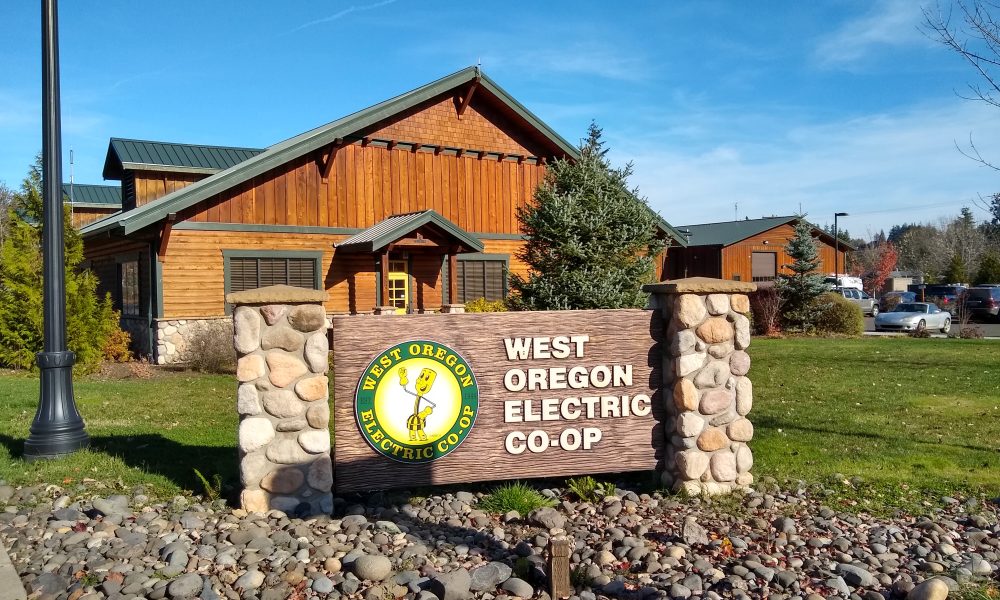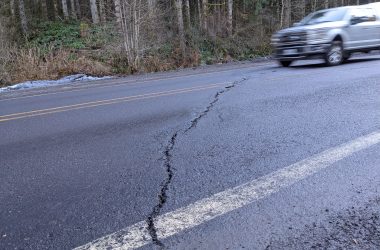First, I’d like to thank Brett Costley for serving as the president of the WOEC board of directors
for the previous two years. He is still on the Board, and I want to thank him for his service as
Board President.
Please note: This year the West Oregon Electric Cooperative Annual Meeting will be again held
in person at the Vernonia School Commons. In keeping with these leaner times, this meeting
will focus more on actual West Oregon business and will not have the previous raffles or full
lunch. Instead, we’ll have snacks and a swag bag with a rain gauge and emergency light,
because, no matter how much we do, the power will go out somewhere, sometime.
A first for WOEC Directors in 2022: All of us have now completed the NRECA Certification
process and are all Credentialed Cooperative Directors. Thanks to the online certification
process, we’ve saved the cooperative a lot of money while being able to take classes to
substantially improve our knowledge of the electric cooperative industry. This means we have
improved our ability to put into context our roles as directors and where WOEC stands within
Oregon, with BPA, and how we–WOEC–compares nationally.
This year we’ve also named a Vernonia native as our full-time General Manager, Billi Kohler.
Although she is young in years, she brings a great depth of maturity and thought to her position,
as well as many years serving members from within West Oregon. The board is very pleased to
watch her grow and mature into this position; she’s smart, and forward thinking, and already has
gained the respect of her peers—no small feat.
On another note, back in 2019, we had begun to have “Member Meetups” where management
and directors went to locations in various districts to meet directly with WOEC members and
answer questions, etc. We had one in Timber at the Fire Station there and had another
scheduled for April, 2020 in Vernonia when Covid put an end to that. We hope to bring back the
Meetups in 2023, advertising them on Facebook and in the Ruralite.
On the operations side, this year WOEC budgeted to purchase a second mower for Right of
Way clearing to be used by our contractors. Since we started mowing the Right of Ways instead
of just clearing and chipping, we’ve been clearing about three times as much ROW in the same
amount of time. The previous mower we bought used, and it needs a lot of maintenance and
repairs. This year we’re investing in a new mower to maximize the limited time we have in the
mowing season. Mowing and tree trimming for our territory is currently on a ten-year circuit, but
we hope eventually to reduce that to three or four years. This should result in a long-term
savings to the members, and better support our wildfire mitigation efforts.
We’ve remained focused on improving system reliability through capital projects, such as, our
Mist to Vernonia Reconductor. We are in the beginning stages of reconstructing our river
crossing lines at the Vernonia Mill Pond. We prioritize these projects on a cost/benefit basis.
This year we will set up a remote-read weather station at the pole yard as part of the RAWS
system—one station among several in Columbia County. The weather station is self-contained, can be portable or permanently installed, and solar-powered. This should provide local and
timely weather data to assist land-management agencies to help monitor air quality, rate fire
danger and provide data for research projects. Especially vital to gathering information for fire
danger, the station can monitor fuel condition and predict fire behavior as information is sent in
real time to monitoring departments in NOAA and the National Interagency Fire Center (NIFC)
in Boise.
This piece of equipment is another vital part serving our Oregon PUC mandated Wildfire
Mitigation Plan that we’ve just completed. While most of our territory is designated “low risk” for
wildfire, that doesn’t mean “impossible” so we’ve already been working on this plan for
approximately two years.
Another first, we’ll be inventorying all our poles and equipment. If you see people taking
photographs of utility poles or entering information on their computers, this is what they’re doing.
We need to update our knowledge of our equipment and where it is to enter that into our
updated GIS (Geographic Information System), as well as verify what companies are renting the
use of our poles for the expanding broadband networks. This will also help us to develop and
update plans for moving our system and meters into the 21st Century.
The 2021-2022 storm season was fairly mild with only a couple of storm-caused extended
power outages–one in December right after Christmas and the late season April surprise. As
members know, restoring power after a storm is expensive and time consuming with crews
often having to return to restore power to the same area multiple times and with WOEC
borrowing crews from other utilities to manage a timely recovery. December’s storm cost us
about $700,000.00 while April’s cost us over $500,000.
During the peak times of Covid-19, we had zero disconnects of our members (FROM APRIL
2020 to September 2021. This wasn’t because the state mandated it, because there was no
such mandate for cooperatives. We did it because we are a cooperative and we are all in this
together, taking care of our own. I’d like to give a shout out to our member services front line
people, Judi Gwin, Kelly Busch, and Margy Prout. Much of this success in not disconnecting
anyone is due to their helping members find the right financial aid or working with them to create
monthly budgeting for their electricity needs. We also want to thank Oregon Energy Fund,
Community Action Team of Columbia County and St. Vincent de Paul’s for their support of our
membership.
We are fully aware that times are still difficult for many people. Remember, if you need financial
assistance, our member service reps are able to help connect you with financial aid
organizations—just call WOEC to start the process.
This year, for the first time in a long time, we will begin to retire and actually distribute capital
credits. In any year where the coop has a positive margin, we allocate that margin to members.
This allocation is made proportional to what the member has paid for electricity in that year. The
term “allocation” does NOT mean immediate retirement or distribution of dollars to members; it means that this number is entered into your account for retirement or distribution at a later date.
It is up to the board to determine when to retire capital credits. Not retiring capital credits can
mean the coop does not need to borrow as much money for capital improvements. The coop
has previously retired all capital credits up through 1969.
At the board’s direction, we’ve already begun the process of retiring capital credits from 1970
through 1979. Since there have been no distributions since 2000, we’ve had to re-invent the
process of locating members, etc. If you were a member on the system back then, you will soon
be receiving information about your distribution.
Members should also know that West Oregon no longer owns any shares in LSN—Light Speed
Network. The company was sold and our share of the sale was approximately $12 million. Of
this, we have already used approximately $3 million to pay off loans that could be retired without
any pre-payment penalty. We are in the process of deciding how and where to invest the
remaining funds to benefit not only today’s members but those down the road thirty years from
now.
As you’ll have noted from the back page of the July Ruralite, we did spend almost four years
involved with another utility as they considered purchasing our territory. Once again, after
extensive fact gathering on their behalf, they decided that it was impossible to service our
territory, make a profit, and bring our current members’ rates into alignment with what their
current rate payers are paying. Historically, this is why WOEC was originally created—to
provide electricity where other utilities refused to do so.
Finally, after many years of service, we bid a fond adieu to our general council, Chuck
Fadeley—he of the Justice of the Peace stories, enjoyed by many at Annual Meetings. He’s
served West Oregon for several decades, and helped to keep us the stable, organized business
we are. We’ve been fortunate to have him keep us on the straight and narrow for many
decades, and he is already sorely missed.
As our new General Council, please welcome Ray Kindley to our organization. Ray, too, has
decades of experience with electric cooperatives, even working with West Oregon twenty years
ago. He’s smart, thoughtful, organized and incredibly knowledgeable. We know we are in good
hands with Ray.
With that, I do hope to see you at the 2022 Annual Meeting!
Erika Paleck
WOEC Director District 5, board president

Chas Hundley is the editor of the Banks Post and sister news publications the Gales Creek Journal and the Salmonberry Magazine. He grew up in Gales Creek and has a cat.





